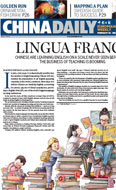Forex issues to take center stage at G20 meeting
Updated: 2011-02-18 10:54
By Fu Jing (China Daily European Weekly)
China needs to exercise caution in further currency moves, say experts
Finance ministers and central bank governors from the G20 nations are expected to discuss global monetary reforms during their weekend meeting in Paris, with once again the spotlight being on China.
With nations like the United States likely to press for further currency reforms in China, the nation needs to be cautious in the steps it takes to internationalize its currency, say analysts and experts.
| ||||
"China needs a gradual process to internationalize its currency If that is the case, it means it can be fully convertible," says Yu Yongding, an economist with the Chinese Academy of Social Sciences and former central bank advisor.
"The nation also needs to consider whether the market can accept such a currency, and whether China's economic and political conditions will allow it to take the required steps," says Yu.
"The process will be gradual and long if China decides to press ahead."
The Paris conclave assumes significance as France holds the reins of both the G8 and G20 this year. France has also been campaigning for a more broad-based currency arrangement and pressing for reducing the excessive dependence on the US dollar.
French President Nicolas Sarkozy has called for better regulation of international capital flows and urged for further strengthening the Special Drawing Rights issued by the International Monetary Fund (IMF) with the addition of the yuan.
Though the Chinese government is yet to announce a roadmap for internationalization of the yuan, it has started making the right moves through currency swaps and by using the renminbi for foreign trade settlements.
China got a shot in the arm recently when the US decided to support the inclusion of the renminbi in the Special Drawing Rights, during President Hu Jintao's recent US visit.
French Finance Minister Christine Lagarde has reiterated the nation's desire to "legitimately meet the challenges facing a multi-polar and unbalanced world".
Lagarde says France has identified five areas for action - identifying the macro-economic imbalances, a reform of the international monetary system, reducing the excessive price volatility of raw materials, establish a seamless financial regulation and to promote development.
Finance ministers and central bank governors of G20 countries are expected to hold three conclaves this year ahead of the annual summit on Nov 3-4 in Cannes. The Paris meeting will be followed by one in Washington between April 14-16 and in Paris from Oct 13-14.
Liu Chunhang, director general of the China Banking Regulatory Commission, feels that the G20 has helped build trust and confidence especially during times of crisis. With globalization of capital flow speeding up, it is vital for China to enhance its cooperation with other nations especially in areas like financial and banking regulations.
China has recently surpassed Japan as the second-largest economy in the world after the US and accumulated massive forex reserves of over $2.85 trillion (2.1 trillion euros) on the back of sustained trade surpluses and foreign fund inflows.
Though China may step up the pace of imports in the next few years, it will also take steps to ensure that its exports remain competitive. At the same time the government will also encourage financial organizations to invest overseas, he says.
Liu, however, feels that while capital flows are becoming increasingly globalized, financial regulations are still domestic concerns only.
"Effective financial regulation requires intense cooperation among regulators and should not be confined to only setting standards but also to daily supervision," says Liu.
The nation's banking regulator, China Banking Regulatory Commission (CBRC), has already started revising the banking regulations to implement the BASEL III capital requirement norms for lenders by 2012.
The IMF is studying the performance of China's financial sector and likely to come out with an assessment report later this year.
Liu admits that the road ahead is not smooth. "There are a number of roadblocks for smooth international collaboration, including the fact that different countries have different legal systems. Most of the countries are at different stages of development, and many have different financial structures," he says.
"Emerging markets have less developed capital markets that may not be suitable for innovative capital instruments. Similarly in many developed countries, there is no uniform financial structure. It is difficult for regulators to come up with rules that conform to all," says Liu.
E-paper

Chinese tourists as top shoppers
Since last summer, Chinese tourists emerged as the top tax-free shoppers in Europe.
Golden run ahead
Looking abroad
Mapping out a plan
Specials

The green lantern
Environmental concerns are shedding new light on a colorful tradition

Inland interchange
Chongqing bets on its position as a hub for China's west.

Zooming in on Chinese skies
Helicopter companies ride on country's growing interest in luxury aviation.

